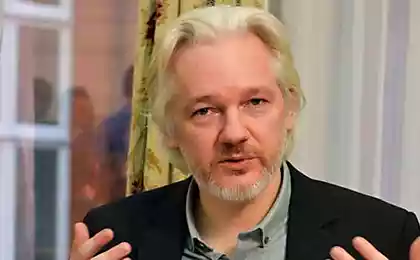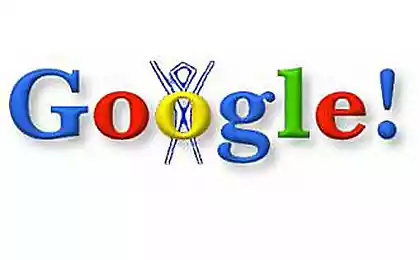619
Julian Assange: Google is not what it seems from the sandbox. Part 1
I stumbled on WikiLeaks to publish excerpts from the book Comrade. Assange «When Google Met WikiLeaks» and was intrigued by the entertaining reading. State coups, surveillance, collusion with the government - then there just is not
.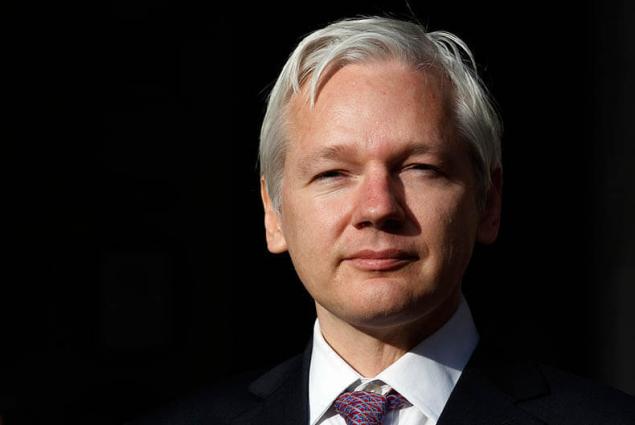
Actually, I want to share it with you, only in Russian. An excerpt was published quite voluminous, so the translation will prepare parts. Original is available round the clock on WikiLeaks, so that everyone can read it in full.
Eric Schmidt is quite an influential figure, even among those powerful personalities with whom I have crossed my path since I created WikiLeaks. In mid-May 2011. I was under house arrest in the county of Norfolk, which is about three hours drive north-west of London.
Punitive measures against our activities turned full-time and every time wore on, it seemed like an eternity. As it was difficult to time something to get my attention. But as my colleague Joseph Farrell said the CEO of Google wants to agree with me about the meeting, I'm all ears.
In a smylse highest echelon of Google was more distant and incomprehensible to me than the government offices in Washington. By the time we clung to the horns of many high-ranking US officials for years. All their mystique disappeared.
However, the rising centers of power in Silicon Valley were strangers to me, and I suddenly realized the opportunity to penetrate what is happening now, which is becoming one of the most powerful on the planet. And that Schmidt was appointed CEO in 2001 and has turned Google into an empire.
I was intrigued by the fact that the mountain comes to Mohammed. But only after Schmidt and his companions visited me, I understood what they were in reality.
The stated reason for the meeting was the book. Schmidt wrote a treatise together with Jared Cohen, director of Google Ideas. The book was supposed to be a guide to the methods used in Google
«brainstorm». At that time I still did not know much about Cohen. In fact, Cohen went to work for Google from the US State Department in 2010. He was a man of Generation Y [approx. 1981-1990], a generator of ideas in the government between the two administrations, the court of world political think tanks and institutions have got there in the twenties.
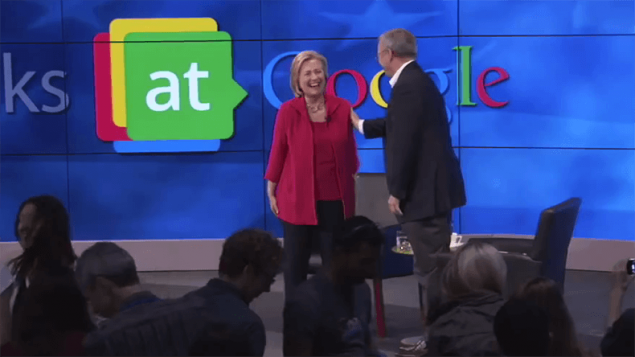
Chairman of the Board of Directors of Google Eric Schmidt shares a joke with Hillary Clinton during the "casual conversation" - a special meeting with employees at the main office in Mountain View, California, July 21, 2014
He grew up in a senior adviser Secretary of State Condoleezza Rice and Hillary Clinton. The government is working in the service of policy planning [approx. Policy Planning Staff, office of the US State Department, serving as an internal "think tank"] Cohen soon got the nickname «Condi's party-starter», passing in political circles buzzwords of Silicon Valley and producing delicious rhetorical nonsense, like "National Diplomacy 2.0" ( «Public Diplomacy 2.0»).
On his personal page at the Council on Foreign Relations website at his or her qualifications stated "Terrorism; radicalization; the impact of communication technologies of the 21st century to statehood; Iran. »
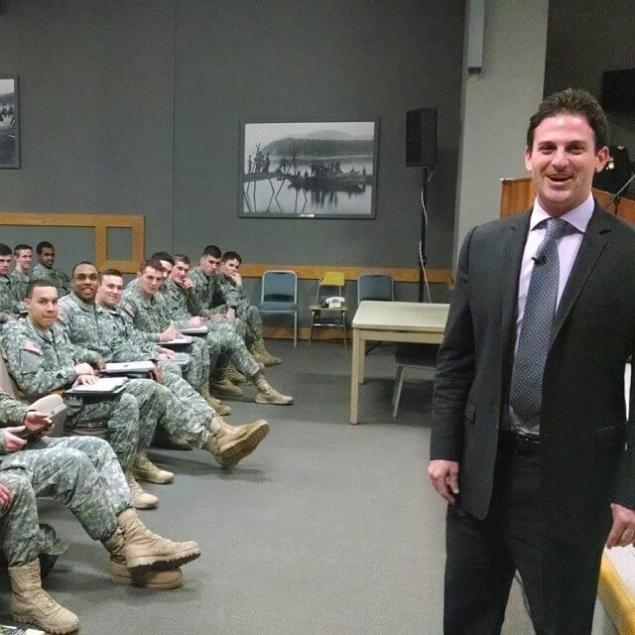
Google Ideas Director Jared Cohen shares his vision of geopolitics with the US Army recruits in the lecture hall of a military academy West Point (West Point Military Academy), February 26, 2014
It was that Cohen, who worked at the State Department, wrote the CEO of Twitter, Jack Dorsey by e-mail with a request to postpone the planned technical work to sodeystovat did not take place in 2009 uprising in Iran.
His documented love affair with Google began in the same year, when he became friends with Eric Schmidt, being on the ruins of Baghdad after the occupation. Just a month later, Schmidt recreated inside Google Cohen usual habitat by developing an internal "think tank", placing it in New York and putting Cohen at the helm. So a Google Ideas.
Later this year, the couple wrote for the journal of the Council on Foreign Relations «Foreign Affairs» material extolling the reform potential of Silicon Valley technology as a tool of US foreign policy. Describing what they called a "coalition of connections» ( «coalitions of the connected»), Schmidt and Cohen argue:
"Democracies are building military coalitions, have the opportunity to build such a relationship, and on the basis of communication technologies. [...] They [the technology] offer new ways to fulfill the responsibility to protect its citizens around the world.. »
In the same text they mention the fact that these technologies are provided mainly by the private sector ( «this technology is overwhelmingly provided by the private sector»). Shortly after the publication, there are events in Tunisia.
Then Egypt, and then on the rest of the Middle East erupted revolution [mentioned events related to the interval 2010-2012]. Echoes of these events presented itself this performance in online media for Western Internet users.
Professional political analysts, plain-hand on events in the description of smoothing uprisings in support of the pro-Western dictators called the incident
«Twitter revolutions". Suddenly, everyone wanted to be at the intersection points of US global influence and social media, and Schmidt and Cohen had already secured a place in this field. Taking the working title "Empire of Reason» ( «The Empire of the Mind»), they began to stretch his article to the book size, simultaneously searching for big and important names in the world of technology and global influence to make them a part of his research.
< br> And they wanted to meet me. I agreed. Agreed in June.
To be continued…
.

Actually, I want to share it with you, only in Russian. An excerpt was published quite voluminous, so the translation will prepare parts. Original is available round the clock on WikiLeaks, so that everyone can read it in full.
Eric Schmidt is quite an influential figure, even among those powerful personalities with whom I have crossed my path since I created WikiLeaks. In mid-May 2011. I was under house arrest in the county of Norfolk, which is about three hours drive north-west of London.
Punitive measures against our activities turned full-time and every time wore on, it seemed like an eternity. As it was difficult to time something to get my attention. But as my colleague Joseph Farrell said the CEO of Google wants to agree with me about the meeting, I'm all ears.
In a smylse highest echelon of Google was more distant and incomprehensible to me than the government offices in Washington. By the time we clung to the horns of many high-ranking US officials for years. All their mystique disappeared.
However, the rising centers of power in Silicon Valley were strangers to me, and I suddenly realized the opportunity to penetrate what is happening now, which is becoming one of the most powerful on the planet. And that Schmidt was appointed CEO in 2001 and has turned Google into an empire.
I was intrigued by the fact that the mountain comes to Mohammed. But only after Schmidt and his companions visited me, I understood what they were in reality.
The stated reason for the meeting was the book. Schmidt wrote a treatise together with Jared Cohen, director of Google Ideas. The book was supposed to be a guide to the methods used in Google
«brainstorm». At that time I still did not know much about Cohen. In fact, Cohen went to work for Google from the US State Department in 2010. He was a man of Generation Y [approx. 1981-1990], a generator of ideas in the government between the two administrations, the court of world political think tanks and institutions have got there in the twenties.

Chairman of the Board of Directors of Google Eric Schmidt shares a joke with Hillary Clinton during the "casual conversation" - a special meeting with employees at the main office in Mountain View, California, July 21, 2014
He grew up in a senior adviser Secretary of State Condoleezza Rice and Hillary Clinton. The government is working in the service of policy planning [approx. Policy Planning Staff, office of the US State Department, serving as an internal "think tank"] Cohen soon got the nickname «Condi's party-starter», passing in political circles buzzwords of Silicon Valley and producing delicious rhetorical nonsense, like "National Diplomacy 2.0" ( «Public Diplomacy 2.0»).
On his personal page at the Council on Foreign Relations website at his or her qualifications stated "Terrorism; radicalization; the impact of communication technologies of the 21st century to statehood; Iran. »

Google Ideas Director Jared Cohen shares his vision of geopolitics with the US Army recruits in the lecture hall of a military academy West Point (West Point Military Academy), February 26, 2014
It was that Cohen, who worked at the State Department, wrote the CEO of Twitter, Jack Dorsey by e-mail with a request to postpone the planned technical work to sodeystovat did not take place in 2009 uprising in Iran.
His documented love affair with Google began in the same year, when he became friends with Eric Schmidt, being on the ruins of Baghdad after the occupation. Just a month later, Schmidt recreated inside Google Cohen usual habitat by developing an internal "think tank", placing it in New York and putting Cohen at the helm. So a Google Ideas.
Later this year, the couple wrote for the journal of the Council on Foreign Relations «Foreign Affairs» material extolling the reform potential of Silicon Valley technology as a tool of US foreign policy. Describing what they called a "coalition of connections» ( «coalitions of the connected»), Schmidt and Cohen argue:
"Democracies are building military coalitions, have the opportunity to build such a relationship, and on the basis of communication technologies. [...] They [the technology] offer new ways to fulfill the responsibility to protect its citizens around the world.. »
In the same text they mention the fact that these technologies are provided mainly by the private sector ( «this technology is overwhelmingly provided by the private sector»). Shortly after the publication, there are events in Tunisia.
Then Egypt, and then on the rest of the Middle East erupted revolution [mentioned events related to the interval 2010-2012]. Echoes of these events presented itself this performance in online media for Western Internet users.
Professional political analysts, plain-hand on events in the description of smoothing uprisings in support of the pro-Western dictators called the incident
«Twitter revolutions". Suddenly, everyone wanted to be at the intersection points of US global influence and social media, and Schmidt and Cohen had already secured a place in this field. Taking the working title "Empire of Reason» ( «The Empire of the Mind»), they began to stretch his article to the book size, simultaneously searching for big and important names in the world of technology and global influence to make them a part of his research.
< br> And they wanted to meet me. I agreed. Agreed in June.
To be continued…
Strawberries in a barrel - a great harvest and save the earth!
Kinesiological test - how the subconscious reveals the cause of the disease


